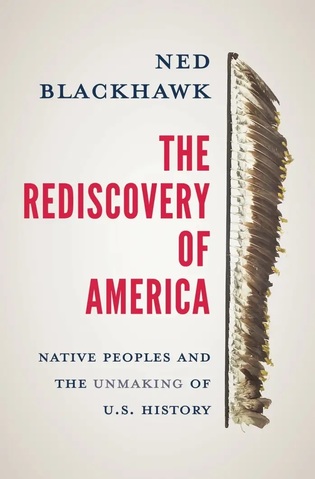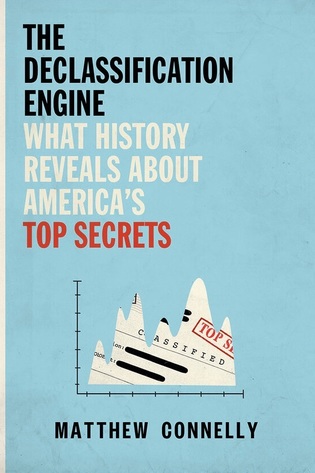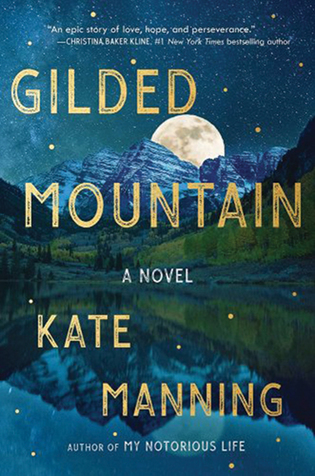
The Rediscovery of America: Native Peoples and
the Unmaking of US History
Ned Blackhawk, Howard R. Lamar Professor of History and American Studies
Yale University Press, $35
Reviewed by James Ledbetter ’86
There are books of history, and then there are books, like this one, that seek to change the way history is written and taught. Ned Blackhawk’s haunting, masterful book wants to recast the entire relationship between the United States and the Native populations that lived on this land before European imperialists arrived.
Although his first few chapters catalogue the vicious slaughter and relocation of Native peoples by Spanish, French, English, and Dutch colonizers, Blackhawk is adamant that he will not create a narrative of pure victimhood. To do so, he argues, is to deny Indigenous people their agency, and to overlook the reality of centuries of coexistence—albeit sometimes violent. “A full telling of American history,” he says, “must account for the dynamics of struggle, survival, and resurgence that frame America’s Indigenous past.”
Some of Blackhawk’s tales are familiar to students of traditional American history, but he also spotlights lesser-known episodes of resistance and accommodation. An example: by 1680, about a century after Spanish settlers first arrived, they had come to dominate most of the populated parts of the Southwest. Yet that year, Pueblo villagers began an uprising, burning churches and killing soldiers in the province of Santa Fe, and driving the Spanish settlers out. The Spanish would not reconquer the territory for another twelve years; Blackhawk labels this “arguably the first American revolution.”
Blackhawk maintains that the very foundation of the present government of the United States is based on the need to subjugate Native populations. Although he stops short of a call for a truth and reconciliation process, his real target is education: “If our schools and university classrooms are to remain vital civic institutions, we must create richer and more truthful accounts of the American Republic’s origins, expansion, and current form.”
James Ledbetter ’86 is the author, most recently, of One Nation Under Gold.
__________________________________________________________________

The Declassification Engine: What History Reveals About America’s Top Secrets
Matthew Connelly ’98PHD
Pantheon Books, $32.50
Reviewed by Ruth Conniff ’90
Matthew Connelly, a history professor at Columbia University, makes a convincing case that an archaic, underfunded system is classifying US government documents in slipshod fashion—leading to a lot of unnecessary classification, the accidental release of sensitive information, and, most worrying, the erasure of history by overwhelmed bureaucrats trying to deal with a fire hose of data they have begun deleting because they don’t have time to review it all.
In his book’s dramatic opening, Connelly faces down a phalanx of government lawyers who threaten to prosecute him under the Espionage Act for his work at Columbia’s History Lab, where he and his team are creating a database of previously classified documents to predict the kinds of information the government keeps secret. He hopes to build a prototype to allow the release of a massive quantity of information that should be public, while also helping the government determine what information it actually needs to protect.
The book traverses the history of the “dark state,” including chapters on surveillance and lethal experiments on unwitting US citizens. It describes CIA boondoggles involving ESP, and an effort to train cats for surveillance. The eagerness of Cold War–era military leaders to shake off the oversight of meddling civilians—US presidents, say—is a sobering segue to the book’s larger message about a military-industrial complex run amok.
Connelly and his merry band of data scientists visit Washington, DC, to sell the government on a big-data solution to the problem of managing secrets. Alas, they discover there’s no money in declassifying documents. If you want a government contract, you need to be working on creating more secret information, not less.
Still, Connelly keeps at it. “To save America’s old and honorable tradition of open government—and to save history itself—we must arm ourselves with the power that knowledge gives, including the power of artificial intelligence,” he writes. It’s a compelling call to action.
Ruth Conniff ’90 is editor of the Wisconsin Examiner.
__________________________________________________________________

Gilded Mountain
Kate Manning ’79
Scribner, $28
Reviewed by Debra Spark ’84
Kate Manning’s third novel, Gilded Mountain, opens with the family of sixteen-year-old Sylvie Pelletier pushing through a 1907 blizzard to find her father in Colorado. He has been working in Moonstone, a high-altitude marble quarry. Sylvie, her mother, and two brothers have come to join him, leaving behind their Québécois family in Vermont for an adventure that quickly morphs into a novel about economic injustice, though its proximate subject is the next two and a half years of Sylvie’s life.
Bright, poor, and quiet, Sylvie enters town just as her passions are emerging. She hungrily observes men and chafes against the era’s strictures on women. After Sylvie wins a school essay contest, she is hired by a no-nonsense local newswoman. Soon Sylvie’s excellent French serves as a pumpkin carriage, winning her a live-in summer job with “the Countess,” the quarry owner’s Belgian wife. One day Sylvie is in her father’s tiny drafty cabin, walls patched with animal hide; the next, she’s living in a castle where animal heads adorn the dining room walls. The new people in Sylvie’s life teach her what she has not learned in school or from her worried, pious mother. Sylvie is further educated by the castle’s Black chef, by the erratic attentions of the mine owner’s dipsomaniac son, by Mary Harris “Mother” Jones (the founder of the Industrial Workers of the World enters the novel to organize the exploited quarry workers), and by her own observations of the haves and have nots. (The mine owner, newswoman, and Countess are fictions, but based on real people.)
Sylvie’s story zips along, an extra tug offered by the frequent reference to tragedy, crimes, and thus drama to come. Even so, Manning makes one want to linger, given the fascinating, presumably accurate historical detail.
Debra Spark’s novel Discipline will be published next year.
 loading
loading

